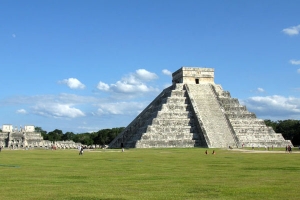Mexico has the most foreign visitors of any Latin American country and is the country most frequently visited by US tourists.1 With its close proximity and rich diversity of culture and geography, Mexico’s popularity as a vacation destination isn’t likely to change any time soon. Mexico continues to be affordable, accessible and blessed with beautiful beaches, resorts and historical treasures.
Many travelers to Mexico have heard of “Montezuma’s Revenge” which is the colloquial term for travelers’ diarrhea contracted by tourists visiting Mexico. Ever since he was defeated by the Spaniards, apparently the ancient Aztec ruler’s only way to get even is to infect the water. To avoid his wrath; drink only sealed and bottled or boiled water and be careful of what you eat. It’s hard to resist the all you can eat buffet at the resort, but try to avoid consuming unpasteurized dairy products (including Mexican-style soft cheeses such as queso fresco), undercooked meat or fish and raw vegetables
Fortunately, malaria is on the decrease in Mexico (still a risk in a few states) and the major resorts are free of malaria. Dengue, however is endemic in Mexico and Chikungunya disease is on the rise in the region. Both are transmitted by mosquitoes, so prevention of insect bites is still your best strategy.
Mexico remains a developing country with many infectious diseases we see less often here in the US. Make sure you are up to date with your routine immunizations like tetanus, chicken pox, measles and influenza. In terms of travel vaccines, you should get a Hepatitis A series and talk to your travel medicine specialist about your risk of typhoid.
You should also consider the Hepatitis B vaccine, especially if your vacation plans include medical or dental treatment. Mexico ranks second only to Thailand as a destination for American patients to receive health services outside the United States, known as medical tourism.2
Good health care is available in most Mexican cities and tourist resorts usually have well-trained physicians available. Injuries, including motor vehicle accidents, still pose the largest risk of death among healthy travelers. Be extra careful when driving, always wear your seatbelt and never mix alcohol and water sports.
So kick back, enjoy a cerveza and take advantage of all that’s waiting for you just south of the border.
1,2 Centers for Disease Control (CDC) Yellow Book, 2016
Fun Random Facts about Mexico:
- The first printing press in North America was used in Mexico City in 1539.
- The National University of Mexico was founded in 1551 by Charles V of Spain and is the oldest university in North America.
- The Chichen Itza Pyramid in Mexico was named one of the new Seven Wonders of the World.

